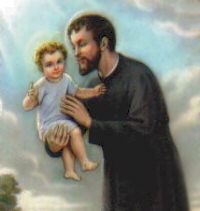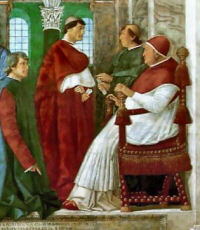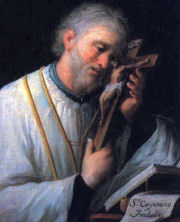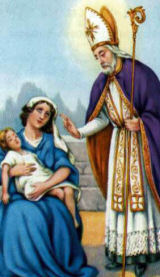
Daily Readings for: August 07, 2013
(Readings on USCCB website)
Collect: By the power of the Holy Spirit, we pray, almighty God, make us docile in believing the faith and courageous in confessing it, just as you granted Saint Sixtus and his companions that they might lay down their lives for the sake of your word and in witness to Jesus. Who lives and reigns with you in the unity of the Holy Spirit, one God, for ever and ever.
O God, who endowed the Priest Saint Cajetan with the grace of imitating the apostolic way of life, grant us, through his example and intercession, to trust in you at all times and to seek unceasingly your Kingdom. Through our Lord Jesus Christ, your Son, who lives and reigns with you in the unity of the Holy Spirit, one God, for ever and ever.
RECIPES
ACTIVITIES
o Religion in the Home for Elementary School: August
o Religion in the Home for Preschool: August
PRAYERS
o Novena to Saint Cajetan - Patron of the Unemployed
Ordinary Time: August 7th
Optional Memorial of Sts. Sixtus II, pope and martyr and companions, martyrs and Optional Memorial of St. Cajetan, priest
Old Calendar: St. Cajetan, confessor; St. Donatus, bishop and martyr
With the future Pope Paul IV, St. Cajetan founded the first congregation of Clerks Regular, a new form of institute which corresponded with the needs of the time. Trust in God was its principal rule; its members were forbidden to ask for alms and depended entirely on the spontaneous charity of the faithful. Such was Cajetan's zeal in seeking the salvation of souls that he came to be called "the hunter of souls." He died at Naples on August 7, 1547.
Today is also the feast of Sts. Sixtus II and his companions, Felicissimus and Agapitus. Pope Sixtus II was one of the first victims of the persecution under the Emperor Valerian. Felicissimus and Agapitus were two of his deacons who were executed with him. Sixtus governed the Church from 256 to 258. His name is mentioned in the Canon of the Mass.
St. Sixture and St. Cajetan's feasts are celebrated today both in the Ordinary Form and the Extraordinary Form of the Roman Rite.
According to the 1962 Missal of Bl. John XXIII the Extraordinary Form of the Roman Rite, today is the feast of St. Donatus. His name occurs second on the list of the bishops of the See of Arezzo. Little is known of him. The Acts of his martyrdom, unfortunately, do not merit credence.
St. Sixtus II and companions
Even as the storm of persecution created by Emperor Valerian raged against the Church, the papal throne was not vacant. Sixtus, a Greek, was elected to succeed Stephen. The emperor's decrees had ordered the Christians to take part in state religious ceremonies and forbade them to assemble in cemeteries. For nearly a year Sixtus managed to evade the authorities before he was gloriously martyred.
Valerian issued his second edict ordering the execution of Christian bishops, priests, and deacons. Sixtus had taken to holding services in the private cemetery of Praetextatus because it was not watched as closely by the authorities as was the cemetery of Calixtus. But in early August of 258, while Sixtus was seated on his episcopal chair and surrounded by the brethren, the soldiers broke in arresting Sixtus and four deacons who were in attendance. After a formal judgment, Sixtus was led back to the very place where he had been arrested, to face execution. His chief deacon Lawrence, upon hearing the news, hastened to his side, desiring to die with his bishop. Sixtus consoled his deacon by telling him that he would follow in three days with even greater glory. The soldiers then placed Sixtus in his chair and swiftly beheaded him. True to the great pope's words, Lawrence was arrested three days later and executed the same day.
Excerpted from The Popes: A Papal History, J.V. Bartlett
Symbols: Cross; sword.
Often Portrayed As: Giving Saint Lawrence a bag of money to give to the poor; with Saint Lawrence; with Saint Lawrence and Saint John the Baptist.
St. Cajetan
Cajetan, a co-founder of the Theatines, received the office of protonotary at Rome from Pope Julius II when still quite young. After he was ordained priest in 1516, he left the papal court and dedicated himself entirely to the service of the Lord. With his own hands he cared for the sick. Such zeal did he show for the salvation of his fellowmen that he was surnamed the "huntsman for souls."
In order to raise the standards of ecclesiastical discipline among the clergy, Cajetan founded in 1524 a community of Clerks Regular who were to lead an apostolic life. They were to look with disdain upon all earthly belongings, to receive no income, to accept no salaries from the faithful; only from that which was freely offered were they allowed to retain the means of livelihood. Thus they were to rely unreservedly upon Divine Providence.
St. Cajetan often prayed eight hours daily. He was particularly active during the Breviary reform under Pope Clement VII. He was kind, mild, but above all, humble. He asked God that no one should know the place of his burial. While attending the Christmas celebration at St. Mary of the Crib, he is said to have been given the grace of receiving from Mary the Child Jesus into his arms. During the sack of Rome by the soldiers of Charles V in 1527, he was tortured and cast into prison because he refused to surrender certain church monies which, in fact, he had distributed among the poor. An insurrection filled him with such grief and sorrow that he took sick and died.
Excerpted from The Church's Year of Grace, Pius Parsch
Patron: job seekers; unemployed.
St. Donatus
"At Arezzo in Tuscany the death of the holy bishop Donatus. Besides other miracles, he restored, by means of his prayer, a chalice broken by pagans, according to the account of Pope St. Gregory I. He was slain under Julian the Apostate about the year 363" (Martyrology).
Legend says that he was born at Nicomedia of parents who had both been slain for Christ's sake. With the holy monk Hilarinus he fled to Arezzo in Tuscany, of which city he afterwards became Bishop. There the Prefect Quadratian, during the persecution under Julian, about 362, commanded both Hilarinus and Donatus to worship idols, and when they both refused, they were slain. Hilarinus was beaten to death with clubs. Donatus was in diverse ways savagely tortured, and then put to the sword. The Christians buried their bodies honourably close by the city.
Symbols: Dragon emerging from a well; chalice; crozier; sword.